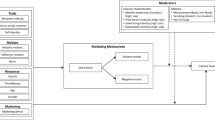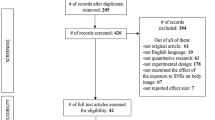Abstract
The prevalence of metabolic syndrome has paralleled the sharp increase in obesity. Given its tremendous physical, emotional, and financial burden, it is of critical importance to identify who is most at risk and the potential points of intervention. Psychological traits, in addition to physiological and social risk factors, may contribute to metabolic syndrome. The objective of the present research is to test whether personality traits are associated with metabolic syndrome in a large community sample. Participants (N = 5,662) from Sardinia, Italy, completed a comprehensive personality questionnaire, the NEO-PI-R, and were assessed on all components of metabolic syndrome (waist circumference, triglycerides, high-density lipoprotein cholesterol, blood pressure, and fasting glucose). Logistic regressions were used to predict metabolic syndrome from personality traits, controlling for age, sex, education, and current smoking status. Among adults over age 45 (n = 2,419), Neuroticism and low Agreeableness were associated with metabolic syndrome, whereas high Conscientiousness was protective. Individuals who scored in the top 10% on Conscientiousness were approximately 40% less likely to have metabolic syndrome (OR = 0.61, 95% CI = 0.41–0.92), whereas those who scored in the lowest 10% on Agreeableness were 50% more likely to have it (OR = 1.53, 95% CI = 1.09–2.16). At the facet level, traits related to impulsivity and hostility were the most strongly associated with metabolic syndrome. The present research indicates that those with fewer psychological resources are more vulnerable to metabolic syndrome and suggests a psychological component to other established risk factors.

Similar content being viewed by others
References
Benjamin L, Wulfert E (2005) Dispositional correlates of addictive behaviors in college women: binge eating and heavy drinking. Eat Behav 6:197–209
Brownell KD, Frieden TR (2009) Ounces of prevention—the public policy case for taxes on sugared beverages. N Engl J Med 360:1805–1808
Chapman BP, Fiscella K, Duberstein P, Coletta M, Kawachi I (2009) Can the influence of childhood socioeconomic status on men's and women's adult body mass be explained by adult socioeconomic status or personality? Findings from a national sample. Health Psychol 28:419–427
Costa PT Jr, McCrae RR (1992) Revised NEO Personality Inventory (NEO-PI-R) and the NEO Five-Factor Inventory (NEO-FFI) professional manual. Psychological Assessment Resources, Odessa
Costa PT, Terracciano A, Uda M, Vacca L, Mameli C, Pilia G, Zonderman AB, Lakatta E, Schlessinger D, McCrae RR (2007) Personality traits in Sardinia: testing founder population effects on trait means and variances. Behav Genet 37:376–387
Courneya KS, Hellsten LAM (1998) Personality correlates of exercise behavior, motives, barriers and preferences: an application of the five-factor model. Pers Individ Dif 24:625–633
Ford ES, Li C (2008) Metabolic syndrome and health-related quality of life among U.S. adults. Ann Epidemiol 18:165–171
Ford ES, Li C, Sattar N (2008) Metabolic syndrome and incident diabetes. Diab Care 31:1898–1904
Goldbacher EM, Matthews KA (2007) Are psychological characteristics related to risk of the metabolic syndrome? A review of the literature. Ann Behav Med 34:240–252
Goodwin RD, Cox BJ, Clara I (2006) Neuroticism and physical disorders among adults in the community: results from the national comorbidity survey. J Behav Med 29:229–238
Goodwin RD, Friedman HS (2006) Health status and the five-factor personality traits in a nationally representative sample. J Health Psychol 11:643–654
Grundy SM (2008) Metabolic syndrome pandemic. Arterioscler Thromb Vasc Biol 28:629–636
Grundy SM, Brewer HB Jr, Cleeman JI, Smith SC Jr, Lenfant C (2004) Definition of metabolic syndrome: report of the National Heart, Lung, and Blood Institute/American Heart Association conference on scientific issues related to definition. Circulation 109:433–438
Grundy SM, Cleeman JI, Daniels SR, Donato KA, Eckel RH, Franklin BA, Gordon DJ, Krauss RM, Savage PJ, Smith SC Jr et al (2005) Diagnosis and management of the metabolic syndrome: an American Heart Association/National Heart, Lung, and Blood Institute scientific statement. Circulation 112:2735–2752
Kochanska G, Murray KT, Harlan ET (2000) Effortful control in early childhood: continuity and change, antecedents, and implications for social development. Dev Psychol 36:220–232
Lepore SJ (1995) Cynicism, social support, and cardiovascular reactivity. Health Psychol 14:210–216
Midei AJ, Matthews KA (2009) Social relationships and negative emotional traits are associated with central adiposity and arterial stiffness in healthy adolescents. Health Psychol 28:347–353
National Cholesterol Education Program Expert Panel (2002) Expert panel on detection evaluation and treatment of high blood cholesterol in adults: third report of the National Cholesterol Education Program (NCEP) Expert Panel on Detection, Evaluation, and Treatment of High Blood Cholesterol in Adults (Adult Treatment Panel III) final report. Circulation 106:3143–3421
Park YW, Zhu S, Palaniappan L, Heshka S, Carnethon MR, Heymsfield SB (2003) The metabolic syndrome: prevalence and associated risk factor findings in the US population from the Third National Health and Nutrition Examination Survey, 1988-1994. Arch Intern Med 163:427–436
Pilia G, Chen WM, Scuteri A, Orrú M, Albai G, Dei M, Lai S, Usala G, Lai M, Loi P et al (2006) Heritability of cardiovascular and personality traits in 6, 148 Sardinians. PLoS Genet 2:1207–1223
Polednak AP (2009) Trends in death rates from tobacco-related cardiovascular diseases in selected us states differing in tobacco-control efforts. Epidemiology 20:542–546
Polk DE, Kamarck TW, Shiffman S (2002) Hostility explains some of the discrepancy between daytime ambulatory and clinic blood pressures. Health Psychol 21:202–206
Pope MK, Smith TW (1991) Cortisol excretion in high and low cynically hostile men. Psychosom Med 53:386–392
Räikkönen K, Matthews KA, Sutton-Tyrrell K, Kuller LH (2004) Trait anger and the metabolic syndrome predict progression of carotid atherosclerosis in healthy middle-aged women. Psychosom Med 66:903–908
Roehling MV, Roehling PV, Odland LM (2008) Investigating the validity of stereotypes about overweight employees: the relationship between body weight and normal personality traits. Group Organ Manage 33:392–424
Scuteri A, Morrell CH, Najjar SS, Muller D, Andres R, Ferrucci L, Lakatta EG (2009) Longitudinal paths to the metabolic syndrome: can the incidence of the metabolic syndrome be predicted? The Baltimore Longitudinal Study of Aging. J Gerontol A Biol Sci Med Sci 64:590–598
Strandbygaard U, Thomsen SF, Backer V (2010) A daily SMS reminder increases adherence to asthma treatment: a three-month follow-up study. Respir Med 104:166–171
Sullivan S, Cloninger CR, Przybeck TR, Klein S (2007) Personality characteristics in obesity and relationship with successful weight loss. Int J Obes 31:669–674
Sutin AR, Terracciano A, Deiana B, Naitza S, Ferrucci L, Uda M, Schlessinger D, Costa PT Jr (2010a) High neuroticism and low conscientiousness are associated with interleukin-6. Psychol Med (in press)
Sutin AR, Terracciano A, Deiana B, Uda M, Schlessinger D, Lakatta E, Costa PT Jr (2010b) Cholesterol, triglycerides, and the five-factor model of personality. Biol Psychol 84:186–191
Terracciano A (2003) The Italian version of the NEO PI-R: conceptual and empirical support for the use of targeted rotation. Pers Individ Dif 35:1859–1872
Terracciano A, Costa PT Jr (2004) Smoking and the five-factor model of personality. Addiction 99:472–481
Terracciano A, Löckenhoff CE, Zonderman AB, Ferrucci L, Costa PT Jr (2008) Personality predictors of longevity: activity, emotional stability, and conscientiousness. Psychosom Med 70:621–627
Terracciano A, Sutin AR, McCrae RR, Deiana B, Ferrucci L, Schlessinger D, Uda M, Costa PT Jr (2009) Facets of personality linked to underweight and overweight. Psychosom Med 71:682–689
Whiteside SP, Lynam DR (2001) The five factor model and impulsivity: using a structural model of personality to understand impulsivity. Pers Individ Dif 30:669–689
Acknowledgements
This research was supported entirely by the Intramural Research Program of the National Institutes of Health, National Institute on Aging. Paul Costa receives royalties from the Revised NEO Personality Inventory.
Author information
Authors and Affiliations
Corresponding author
About this article
Cite this article
Sutin, A.R., Costa, P.T., Uda, M. et al. Personality and metabolic syndrome. AGE 32, 513–519 (2010). https://doi.org/10.1007/s11357-010-9153-9
Received:
Accepted:
Published:
Issue Date:
DOI: https://doi.org/10.1007/s11357-010-9153-9




